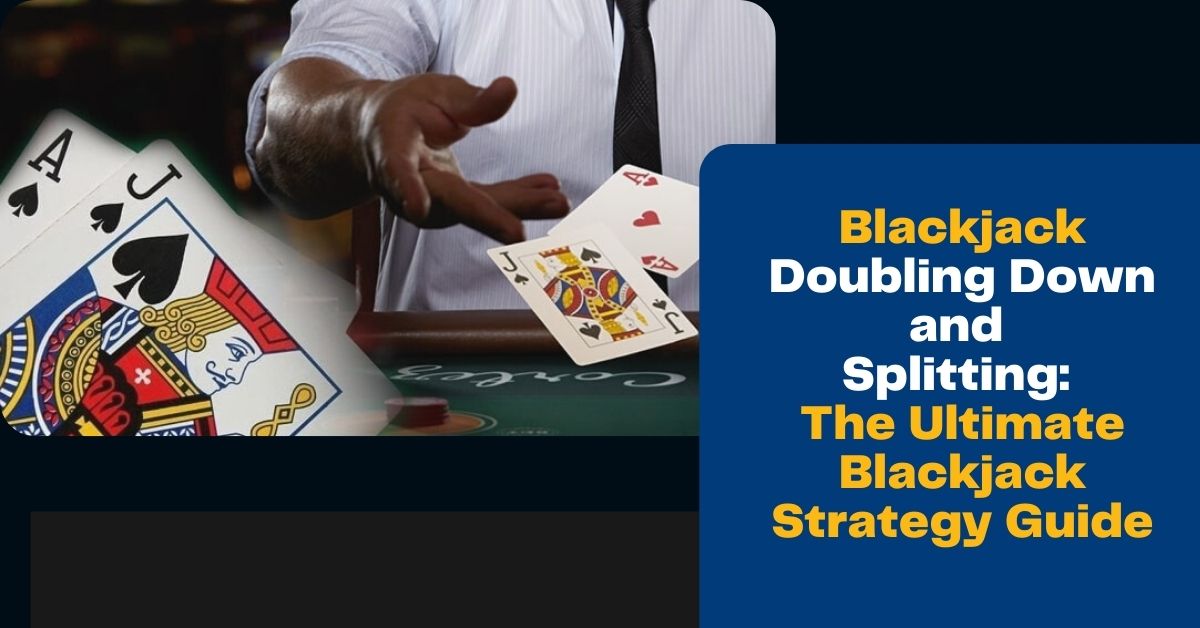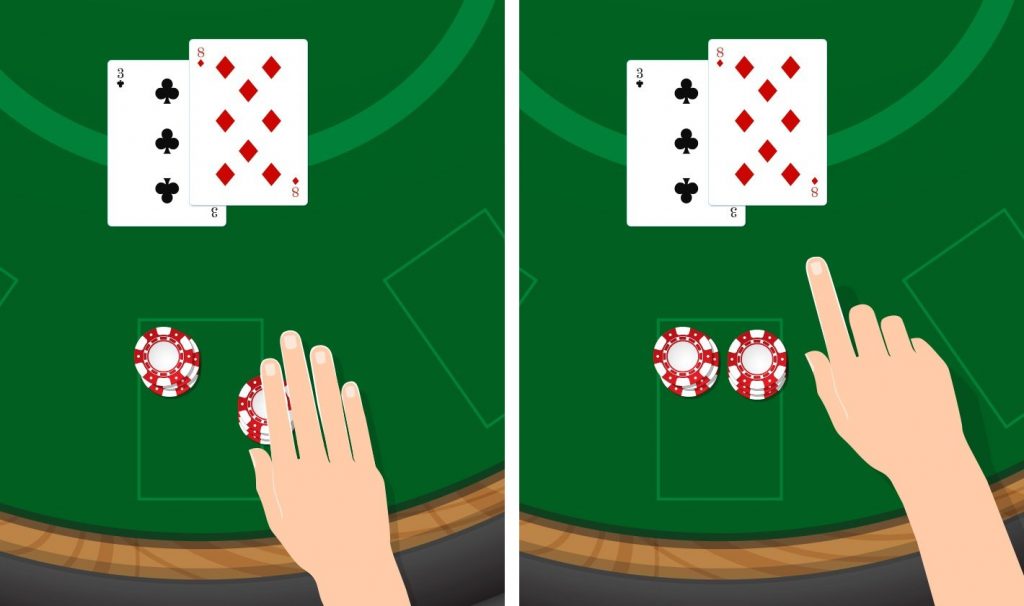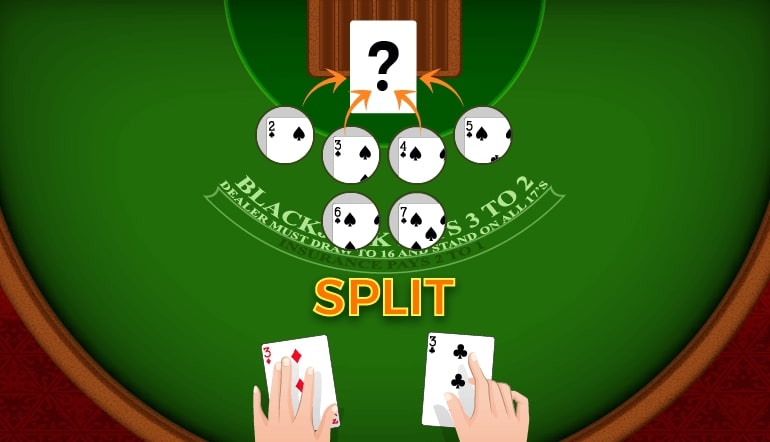Blackjack Doubling Down and Splitting: The Ultimate Blackjack Strategy Guide

There are only two options for players to choose from, and the purpose of the game is to outdraw or outplay the dealer. Depending on the worth of their original hand, they may either hit or stand.
The game of blackjack in live casino, however, has a few more rules that many rookie players are unaware of or do not completely comprehend. Of course, we are referring to doubling down and splitting the stakes.
We will go into great depth about these two blackjack techniques in this essay. On the subject of blackjack double downs and splits, we will go into further detail here.
- What should be done and why should it be done,
- You are permitted to split when you are allowed to,
- Different rules apply to splitting and doubling down in blackjack,
- Splitting and Doubling down samples
If you have ever wondered how to double or split in blackjack, you have come to the right place.

Blackjack Double-Down Basics
After the initial two cards have been dealt, doubling down in blackjack enables a player to double their wager for the round and get an extra card in exchange.
However, some dealers may refer to this strategy as “reaching deep,” which is a more accurate description.
When it comes to doubling down, various blackjack games have distinct regulations. It is possible to acquire another card in certain versions of the game despite needing to double down on any two cards if the two-card sum is much less from over 10 or 11.
You cannot draw any more cards once you double down and acquire an extra card.
It is possible to double down even after splitting hands in certain blackjack variants. As for the latter, we’ll get to that further on.
What is the Point of Going Double Down?
Sometimes, doubling down is an excellent strategy that reduces the house advantage.
In addition to your own cards, you should also consider the dealer’s card while deciding whether or not to double down.
When dealt a 10 or 11, most seasoned blackjack players will choose to double their wager. With a one in three probability of hitting another 10-value card, you are likely to defeat the dealer in this situation.
Even though the dealer’s first two cards are valued at 6, doubling down is an easy option when your hand has an initial value of 9, 10, or 11. Due to the fact that the dealer must continue to strike until he or she reaches seventeen, the dealer has a good chance of busting out.
It is always a promising idea to double down unless your first cards are great, or you want to split it when the dealer’s first card is poor.
However, you should never double down if the dealer has a powerful card, like an Ace, regardless of your own cards.
Because doubling down may be quite rewarding if done correctly, you should know this rule before you sit down to play.
Double-Downing in Action
Here are a few instances of doubling down in blackjack to help you better understand this concept.
In this example, let us assume that the dealer’s three cards are a 2, 7, and 8. Because the dealer needs to take at least two cards and may easily go broke, this is an exciting moment to double down.
Here’s how things may go in this case:
- Your total is now seventeen if you drew an eight.
- A dealer is dealt 5, 7, and 9, totalling twenty-four.
- This signifies that the dealer has a total of twenty-four and that you win.
It is important to remember that this is an ideal scenario, and you will not always be that fortunate.

Blackjack Splitting: The Essentials
This is exactly what it sounds like: splitting your first-hand into two different hands and playing each of them separately.
Although there is a requirement that each of your cards must have always had the same face value (e.g.
- A pair of threes
- A pair of tens
- A pair of kings
Splitting a Jack and an Ace, for example, is possible at certain blackjack tables if you have two 10-value cards. Splitting is not mandatory; therefore, you may choose whether or not to divide your cards or not.
Double your gamble whenever you split a hand so that each hand has the same stake. Your fresh hands will draw one extra card apiece, and you will play them one at a time.
There are three outcomes from here:
- Both hands win at a time
- Neither hand win at a time
- Only one hand win at a time
Some blackjack tables ban double downs after a split, but you may always double down on each of your split hands if you would like.
It is possible to further divide your hands if you receive two matching pairs, although this seldom occurs at blackjack casinos.
After splitting a pair of Aces, another rule dictates that you can only obtain one more card and cannot hit again.
In Blackjack, When May You Make A Split Bet?
A beginner to blackjack may find the tactics for splitting difficult, but we will provide you with some basic advice anyhow.
You should always divide eights and Aces, according to the usual norm.
You cannot go wrong with splitting aces since it provides you with the highest chance of winning both hands.
It is better to divide the eights and attempt to construct something from each of them rather than a 16-card hand, which is poor on its own.
It is not a smart idea to split the four, five, and six-card sets, since they are a terrific value to hit on. A solid possibility for splitting exists with 2, 3, and 4 since these cards are easy to build upon and are less likely to burst if you draw another card.
As a result, it is pointless to attempt to separate the value of a 10-value card.
You should, of course, keep an eye on the dealer’s up card and factor in the hazards of splitting while considering your options.
A Splitting Example
What if you had two Aces in your hand?
Assuming you have a total of twelve, it is imperative that you split, since failing to do so will result in you popping out.
If you split aces twice, you have a good chance of getting blackjack on both hands.
This is how things might go down:
- Your two Aces were divided as the dealer drew a seven.
- When your first Ace has a five and your second Ace has a Jack, you have a total of sixteen and a blackjack.
- Since you drew Aces, you can’t get much farther.
- The dealer gets a total of seventeen after drawing a ten.
- After losing the first hand, the dealer wins the second hand and gives you a 3:2 reward.
Conclusion
Blackjack is made more thrilling by the possibility of splitting and doubling down. These rules provide participants with greater control over their own risk-taking and decision-making abilities.
Here at Blackjack Basics, we hope that this article has provided you with enough information to confidently take on the blackjack tables. At BK8 Singapore, you can play the greatest online blackjack games.

